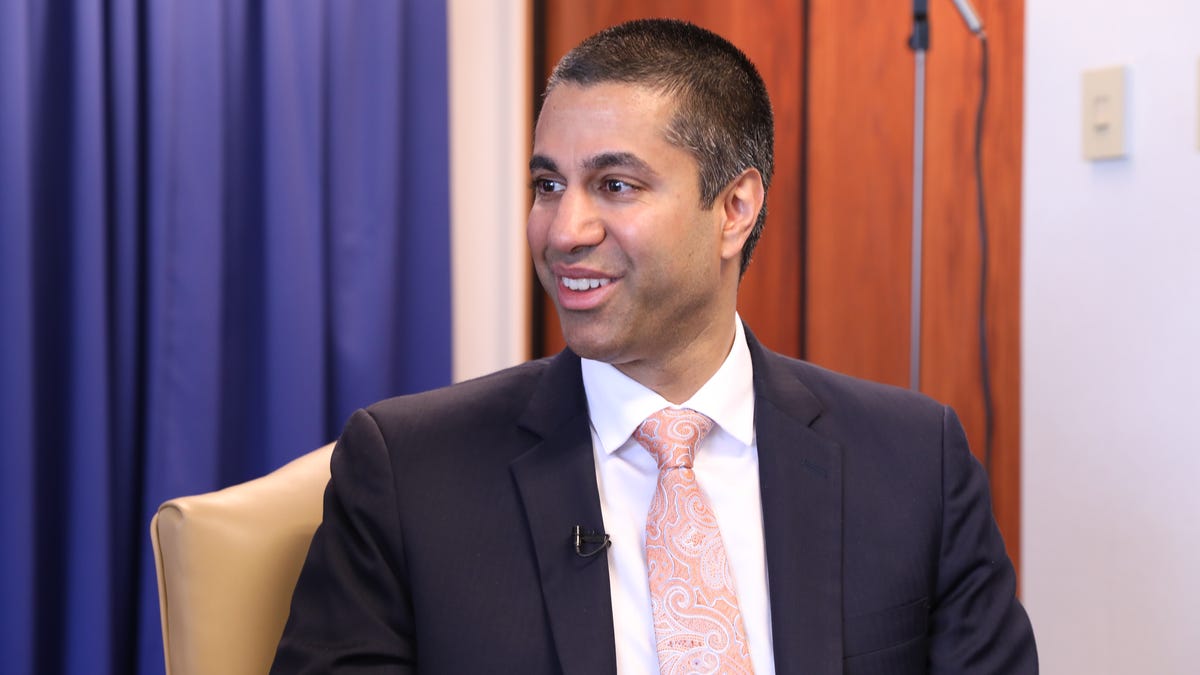Ajit Pai’s FCC broadband adviser nabbed in alleged $250M fraud plan
Elizabeth Ann Pierce, former head of a telecom firm in Alaska and Pai's pick as a broadband adviser, is in trouble for allegedly bilking investors.

Ajit Pai, chairman of the FCC, discussing net neutrality last year.
A woman chosen by Federal Communications Commission Chairman Ajit Pai to chair a broadband advisory group was arrested last week on charges of fraud.
Elizabeth Ann Pierce, former CEO of Alaska-based telecommunications company Quintillion Networks, is accused of forging contracts to get investors to cough up more than $250 million.
After being charged with wire fraud, she surrendered on April 12 in New York to FBI agents. She faces a prison sentence of up to 20 years. The arrest was first reported by The Wall Street Journal.
Pierce was chosen by Pai to lead his Broadband Deployment Advisory Committee (BDAC) in 2017. The mission of the group is to provide advice and make recommendations on how to accelerate the deployment of broadband by reducing and removing regulatory barriers. According to the broadband news site Stop the Cap, she may have attracted Pai's attention by complaining about the permitting process required to bring broadband to rural Alaska.
The FCC said she resigned from the committee in September. The new chair of the committee is Elizabeth Bowles, who is president and chair of Aristotle, a wireless broadband provider based in Arkansas. The agency declined to comment further.
Pierce, who had served as CEO of Quintillion since the company formed in 2012, resigned from the company in August of 2017, citing "personal reasons," according to a company press release issued at the time.
Kristina Woolston, Quintillion's vice president of external relations, told Alaska Public Media the company discovered the alleged fraud in 2017 and reported it to federal authorities. The alleged fraud occurred from May 2015 to July 2017.
Woolston wouldn't say whether Pierce's resignation was related to the allegations of fraud, according to APM.
Trouble brewing on BDAC
The Broadband Deployment Advisory Committee, which Pierce chaired for five months, has been criticized for relying too heavily on input from the broadband industry with little consideration of contributions from local and state officials.
Earlier this month, New York City CTO Miguel Gamino Jr. resigned from the committee's Model Code for Municipalities Working Group, stating in a letter sent to Pai that the group's process has favored the interests of large service providers, like AT&T and Verizon, while not taking into consideration concerns from local communities.
"The membership structure and meeting format of the BDAC has skewed the drafting of the proposed recommendations towards industry priorities without regard for a true public-private partnership," Gamino wrote. "These circumstances give me no choice but to step away from this committee in order to direct the City's energy and resources to alternative forums that provide more productive opportunities for achieving the kind of cooperative progress in advancing broadband deployment in the public interest."
Officials from other cities have come to the same conclusion. In January, San Jose Mayor Sam Liccardo also stepped down from the BDAC, citing concerns that AT&T and Verizon were being given too much leeway in deploying network equipment at the expense of communities' best interests, according to a report by Axios.
"It has become abundantly clear that despite the good intentions of several participants, the industry-heavy makeup of BDAC will simply relegate the body to being a vehicle for advancing the interests of the telecommunications industry over those of the public," Liccardo said in his resignation letter.
An FCC spokesman said the BDAC has representation from all sectors, including state and local government, and has been working hard to develop consensus around deployment issues.
But city leaders aren't the only ones with concerns about the BDAC. FCC Commissioner Mignon Clyburn, one of two Democrats on the FCC, has likewise said that the committee is driven too much by the agenda of large broadband companies.
"It is regrettable that the concerns of localities do not appear to have been fully addressed," Clyburn said in her prepared remarks for a BDAC meeting in January.
Clyburn added she was disappointed that BDAC had exclusively focused its efforts on broadband expansion on deployments led by companies, while ignoring projects led by municipalities. She said this single-minded focus on industry deployments may not meet the needs of every community.
"As I have said many, many times before, one size does not fit all," she said. "And private industry infrastructure investments do not always flow to communities that are most in need."
Originally published at April 17 at 9:41 a.m. PT.
Updated 10:58 a.m. PT: Added information about Pierce's resignation from BDAC and Quintillion, as well as background information about the FCC committee.
Cambridge Analytica: Everything you need to know about Facebook's data mining scandal.
iHate: CNET looks at how intolerance is taking over the internet.



